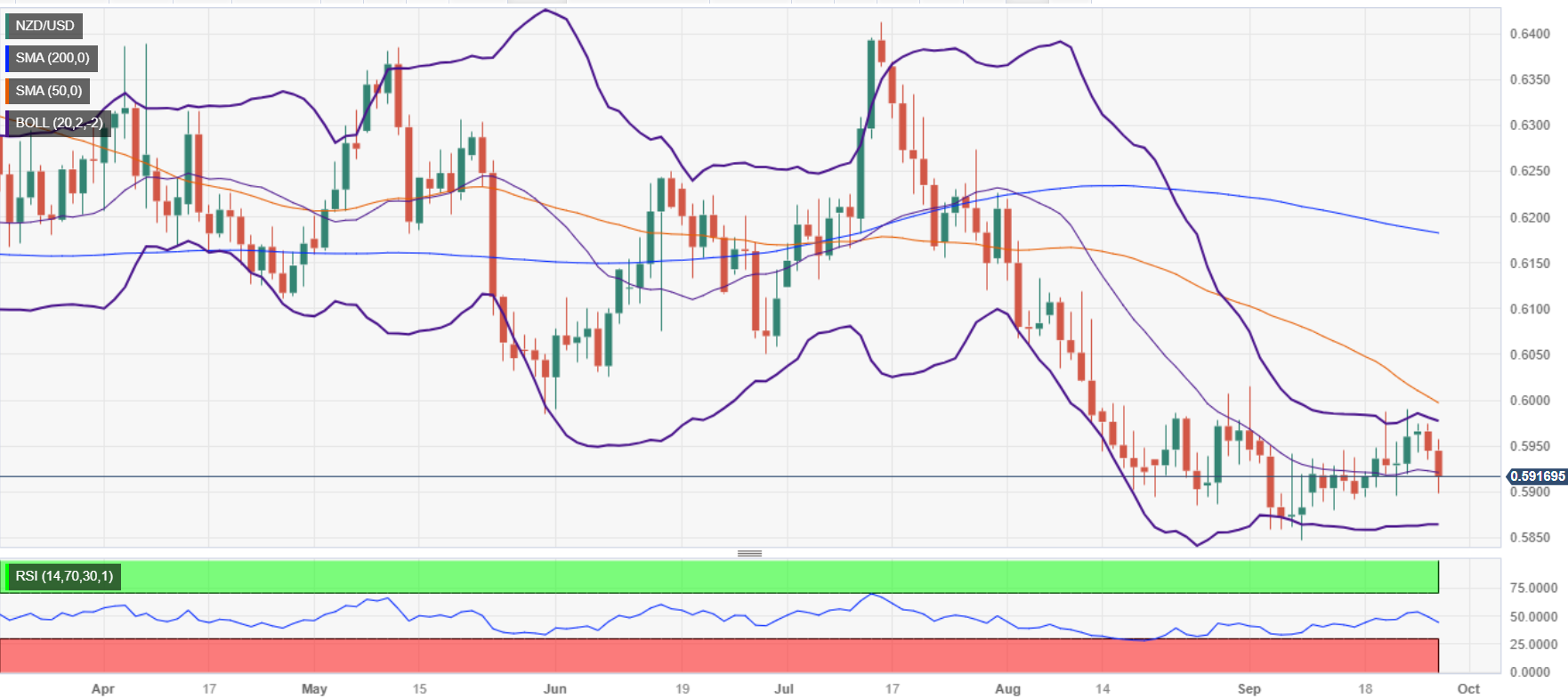- The NZD/USD pair will remain fragile amid mixed sentiment in US markets.
- Federal Reserve officials, led by Minnesota Fed President Neil Kashkari, maintain a hawkish stance, anticipating possible rate hikes and a 60% chance of a soft landing.
- Economic data of interest: Business confidence in New Zealand, while in the US the agenda will include GDP revisions in the second quarter.
The New Zealand Dollar (NZD) lost ground against the US Dollar (USD) late in the New York session, after hitting a daily high of 0.5956, but erased those gains on sour market sentiment spurred by events in the United States. United States (USA). Thus, the NZD/USD pair is trading at 0.5922, with a decrease of 0.37%.
The New Zealand Dollar (NZD) struggles against the robust US Dollar (USD) as market participants weigh developments in the US economy and signals from the Federal Reserve
Market sentiment remains fragile as investors jumped in and lifted two of the three major stock indexes in the United States (US), changing the mixed mood. However, US Treasury yields remain near year-to-date highs, while the US Dollar Index (DXY) retreats from a year-to-date high of 106.83 to 106.62, marking a gain. of 0.42%.
Federal Reserve officials remain hawkish, and Minnesota Fed President Neil Kashkari continued his parade on Wednesday. Summarizing what he has said, he remains a hardliner, foresees at least one more rate hike and sees a 60% chance of achieving a soft landing. Kashkari added that he expects the Fed to keep holdings “stable” through 2024.
Ahead of the Wall Street open, the US Commerce Department revealed that August durable goods orders rose more than expected, 0.2% month-on-month, versus estimates for a -0.2% drop. Excluding transport, the so-called core stood at 0.4% month-on-month, above estimates and the 0.1% expansion of the previous month.
Meanwhile, the kiwi (NZD) is getting some signals from Australia’s latest inflation figures, which, although at 5.2% as expected, failed to support the antipodes. Therefore, sellers piled in and dragged prices towards the week’s low at 0.5899 before reversing course, and hovering around current exchange rates.
Looking ahead to the week, New Zealand ANZ business confidence and Australian retail sales will serve as indicators. In the United States, the final revision of the Gross Domestic Product (GDP) for the second quarter, pending home sales, initial applications for unemployment benefits and data from the Fed. The Fed’s preferred inflation indicator will be known on Friday , the underlying PCE.
NZD/USD Price Analysis: Technical Outlook
After forming a bearish candlestick pattern, the NZD/USD pair fell to a new four-day low at 0.5899, but buyers who stepped into the 0.5900 area lifted the pair. Despite its bearish bias, the pair must reclaim the September 5 low at 0.5859, to record a new cycle low that could extend the downtrend and open the door to challenging the November 3, 2022 low at 0.5740. To the upside, NZD/USD’s first resistance would be 0.5950, followed by the 50-day moving average (DMA) at 0.5996.

NZD/USD
| Overview | |
|---|---|
| Latest price today | 0.5925 |
| Today Daily Change | -0.0020 |
| Today’s daily variation | -0.34 |
| Today’s daily opening | 0.5945 |
| Trends | |
|---|---|
| daily SMA20 | 0.5923 |
| daily SMA50 | 0.6004 |
| SMA100 daily | 0.6089 |
| SMA200 daily | 0.6184 |
| Levels | |
|---|---|
| Previous daily high | 0.5974 |
| Previous daily low | 0.5935 |
| Previous weekly high | 0.599 |
| Previous weekly low | 0.5894 |
| Previous Monthly High | 0.6219 |
| Previous monthly low | 0.5885 |
| Daily Fibonacci 38.2 | 0.595 |
| Fibonacci 61.8% daily | 0.5959 |
| Daily Pivot Point S1 | 0.5929 |
| Daily Pivot Point S2 | 0.5912 |
| Daily Pivot Point S3 | 0.589 |
| Daily Pivot Point R1 | 0.5968 |
| Daily Pivot Point R2 | 0.599 |
| Daily Pivot Point R3 | 0.6007 |
Source: Fx Street
I am Joshua Winder, a senior-level journalist and editor at World Stock Market. I specialize in covering news related to the stock market and economic trends. With more than 8 years of experience in this field, I have become an expert in financial reporting.







